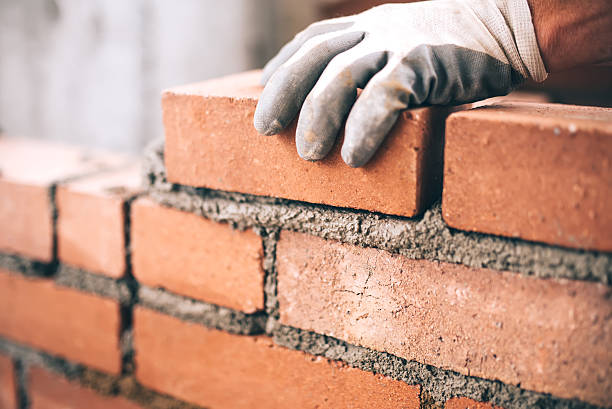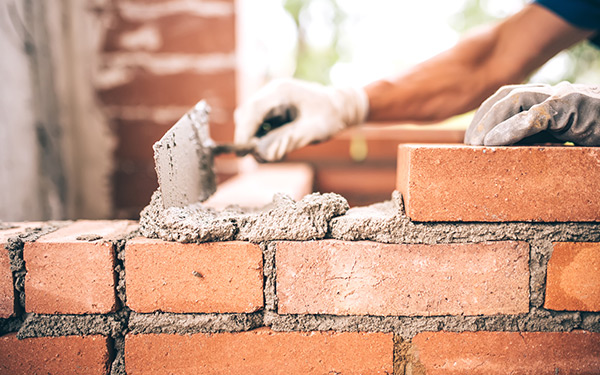Unlocking the Secrets of Lasting Masonry Construction Practices for Eco-Friendly Buildings
Among the myriad strategies to environmentally friendly building, lasting masonry construction stands out as a time-tested and long lasting method that holds a wide range of untapped potential. From the selection of materials to innovative construction strategies, the tricks to achieving sustainability within stonework building are diverse and intriguing.
Advantages of Sustainable Masonry Building
Welcoming lasting stonework construction methods not just decreases environmental effect however additionally supplies long-term economic benefits to home builders and areas. By making use of products like recycled blocks, obstructs, and rocks, builders can considerably decrease the carbon footprint of their projects while promoting resource effectiveness. Additionally, lasting stonework building techniques, such as appropriate insulation and thermal mass residential or commercial properties, can boost energy efficiency within buildings, resulting in decreased functional expenses in time.
Moreover, the durability and strength of masonry frameworks add to lasting economic advantages. Structures built using sustainable stonework practices usually require much less repair and maintenance, converting to cost financial savings for home builders and homeowner. The long life of masonry products likewise ensures that structures continue to be secure and safe and secure, lowering the demand for frequent remodellings or replacements.
Eco-Friendly Stonework Materials
Making use of environmentally friendly masonry materials is a critical step towards enhancing the sustainability of construction practices and lessening ecological effect while maximizing long-term economic benefits. Sustainable stonework products are sourced, created, and used in a fashion that lowers total ecological impact. Lasting concrete obstructs include recycled accumulations and might include better insulation residential or commercial properties, contributing to energy efficiency in buildings.
Additionally, natural materials like adobe, rammed planet, and straw bundles provide excellent thermal mass properties, minimizing the need for home heating and cooling power. These products are typically locally offered, promoting regional economic climates and decreasing transportation-related carbon exhausts. By selecting green masonry products, construction jobs can significantly minimize their environmental footprint and add to the creation of much healthier, more lasting built settings.
Energy-Efficient Masonry Strategies
Energy effectiveness plays a crucial role in improving the sustainability of stonework construction practices. One crucial energy-efficient stonework strategy is the use of thermal mass, which involves including thick materials like concrete or brick into the structure's framework to soak up and store warm.

Developments in Sustainable Masonry
Current innovations in lasting masonry practices have brought about ingenious techniques that are reshaping the construction industry. One such innovation is the development of self-healing concrete, which makes use of microorganisms installed within the concrete to recover splits autonomously. This innovation not just lowers upkeep expenses yet likewise improves the resilience of stonework frameworks, adding to their sustainability.
One more noteworthy advancement is the use my sources of recycled aggregates in masonry building and construction - masonry contractor. By incorporating materials such as smashed ceramic stamped concrete driveway designs waste or recycled glass right into concrete mixes, home builders can lower the ecological impact of building jobs while preserving architectural honesty. This practice not only diverts waste from land fills but additionally conserves natural deposits, making it a key improvement in lasting stonework building
In addition, the assimilation of digital style devices, such as Structure Information Modeling (BIM), is transforming the method stonework frameworks are intended and built. BIM enables even more accurate computations, minimized product wastefulness, and improved energy effectiveness, inevitably bring about more sustainable structure techniques. These developments jointly represent an encouraging future for sustainable masonry building in the age of environmentally friendly buildings.
Future Trends in Masonry Sustainability
With the cutting-edge strides made in lasting masonry techniques, the future fads in stonework sustainability are positioned to more change the building and construction sector. Among the vital fads forming the future of stonework sustainability is the boosted combination of technology. Developments such as Building Info Modeling (BIM) and online truth simulations are cement companies near me being used to enhance masonry building and construction procedures, bring about lowered product waste and enhanced energy performance in structures.
In addition, the growth of unique lasting materials is readied to play a significant duty in boosting the eco-friendliness of stonework building and construction. masonry contractor. Technologies like self-healing concrete, recycled aggregates, and bio-based binders are gaining traction for their capability to reduce environmental impact while maintaining structural honesty

Verdict
To conclude, sustainable stonework building techniques provide various advantages for eco-friendly buildings. By utilizing green products and energy-efficient techniques, stonework can add to an extra lasting constructed setting. Innovations in sustainable stonework are continually being created to better boost the ecological efficiency of buildings. Looking towards the future, the trend of masonry sustainability is expected to expand, leading to more eco-friendly and energy-efficient building and construction techniques in the years ahead.